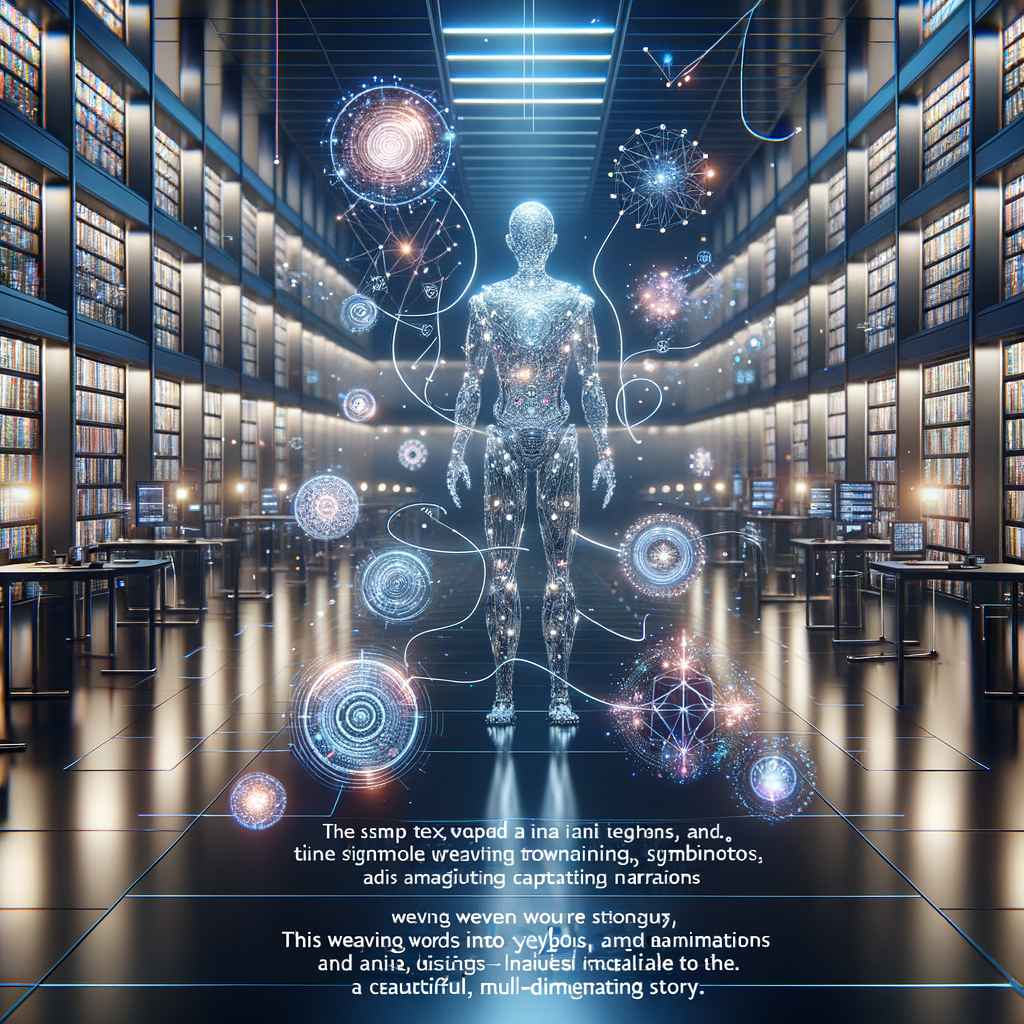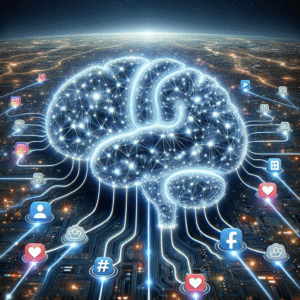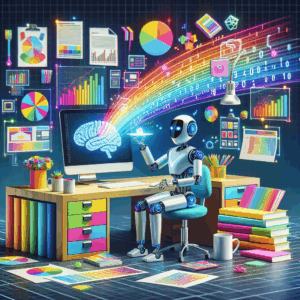
AI In Storytelling: Stunning Designs For Effortless Narratives
- The Rise of AI in Storytelling
- Understanding AI's Role in Storytelling
- How AI Transforms the Writing Process
- Enhanced Brainstorming
- Real-Time Editing Assistance
- Content Personalization
- Tools for AI-Driven Storytelling
- Exploring Chatbot Capabilities
- Natural Language Processing (NLP)
- The Benefits of AI in Storytelling
- Challenges and Ethical Considerations
- Creative Authenticity
- Ownership Issues
- Ethical Storytelling
- AI and Collaborative Storytelling
- The Future of AI in Storytelling
- Embracing Change in the Creative Process
- Real-Life Applications of AI in Storytelling
- Video Games
- Film and Television
- Marketing and Branding
- Conclusion: The Storyteller's New Ally
- FAQs
- References
The Rise of AI in Storytelling
Storytelling has been around for centuries. From oral traditions to written tales, humans have long sought to share experiences and emotions through narratives. Now, artificial intelligence (AI) is becoming an integral part of this timeless art. With its ability to analyze trends, understand emotions, and generate content, AI is transforming storytelling into a more accessible and intriguing experience for creators and audiences alike.
AI doesn’t just assist with storytelling; it enhances the entire creative process. In this article, we will explore how AI reshapes storytelling, the tools involved, and how writers can harness this technology to craft stunning narratives effortlessly. By integrating AI into storytelling, writers can focus on the heart of their tales while leaving some of the more tedious tasks to advanced algorithms.
Understanding AI’s Role in Storytelling
AI plays several roles in storytelling. Primarily, it helps writers generate ideas, develop characters, and even construct entire narrative arcs. But how does this work?
1. Idea Generation: AI can analyze vast datasets to identify popular themes, tropes, and structures in stories. This analysis helps writers discover unique angles for their narratives.
2. Character Development: By understanding character traits and interactions, AI can suggest complex, relatable characters that resonate with audiences.
3. Plot Structuring: AI tools can assist in mapping out story arcs, ensuring that the narrative flows logically and captures readers’ attention.
While AI tools provide useful drafts and suggestions, they do not replace the writer’s creative essence. Instead, they enhance the storytelling process, allowing writers to explore new creative avenues effectively.
How AI Transforms the Writing Process
The writing process can be challenging. Writers often face writer’s block or struggle with pacing. AI significantly alleviates these issues by offering several solutions:
Enhanced Brainstorming
Writers can face a blank page, filled with anxiety about how to begin. AI helps by generating prompts based on previous literature. For example, tools like OpenAI’s GPT-3 can produce writing prompts tailored to your desired genre, making brainstorming a less daunting task.
Real-Time Editing Assistance
AI-powered editing tools, like Grammarly or Hemingway, provide real-time feedback on grammar, style, and readability. With their assistance, writers receive insights that improve clarity and coherence, ensuring that narratives resonate with audiences.
Content Personalization
Writers often need to consider their target audience. AI can analyze audience preferences and habits, suggesting tailored content that aligns with what readers want. This personalization helps improve engagement and keeps readers coming back for more.
Tools for AI-Driven Storytelling
The landscape of AI storytelling tools is rich and varied. Here’s a closer look at some popular tools that can amplify the storytelling experience.
| Tool | Functionality | Best For |
|——————-|————————————————–|————————————|
| ChatGPT | Generates dialogues or full narratives | Fiction and scriptwriting |
| Jasper | Helps in creating blog posts and marketing copy | Content creators and marketers |
| Writesonic | Assists with article ideas and outlines | Bloggers and agencies |
| Sudowrite | Offers creative prompts and suggestions | Fiction writers |
| Grammarly | Provides grammar, style checks, and readability | All writers |
Each tool serves unique functions, allowing writers to select one that fits their needs best.
Exploring Chatbot Capabilities
Chatbots, like ChatGPT, can maintain conversations and generate human-like responses. They can listen to a story pitch and return suggestions for characters or plot twists. This interaction stimulates creativity, acting as a brainstorming partner for writers.
Natural Language Processing (NLP)
NLP plays a significant role in storytelling through AI. It helps machines understand and generate human language more effectively. For authors, this technology means improved assistance in editing drafts, offering suggestions on sentence structure, tone, and voice. The smoother your writing process, the more time you can allocate to crafting your narrative.
The Benefits of AI in Storytelling
Incorporating AI into storytelling offers numerous advantages. Here are some key benefits:
1. Efficiency: AI speeds up the writing process. Writers can generate drafts faster and focus on refining their narratives.
2. Accessibility: AI tools can help emerging writers find their voices and overcome challenges, making storytelling accessible to a broader audience.
3. Diversity of Ideas: AI can introduce fresh perspectives and ideas that writers might not consider, enriching the narrative landscape.
4. Data-Driven Insights: By analyzing reader preferences, AI helps writers create stories that resonate, ensuring greater engagement.
The intersection of storytelling and AI reveals countless possibilities. Writers who embrace these advancements can explore new realms of creativity and storytelling engagement.
Challenges and Ethical Considerations
Despite the many advantages, the integration of AI in storytelling also poses certain challenges. Understanding these challenges ensures responsible usage.
Creative Authenticity
One of the main concerns is about maintaining a writer’s unique voice. When writers rely too heavily on AI suggestions, they may inadvertently dilute their creative authenticity. It’s vital for authors to use AI as a tool rather than a crutch.
Ownership Issues
The question of intellectual property also arises. If AI generates a piece of writing, who owns the rights to that work? Clarifying these issues helps prevent disputes and protects the rights of both human and machine creators.
Ethical Storytelling
Writers must consider the ethical implications of using AI in their narratives. For instance, AI could inadvertently perpetuate biases if trained on flawed datasets. It’s crucial for storytellers to remain vigilant about the narratives they share to ensure they uplift and empower diverse voices.
AI and Collaborative Storytelling
One exciting area of AI in storytelling is collaborative storytelling. Imagine a platform where multiple writers interact and contribute to a single narrative in real-time, guided by AI. The possibilities are vast:
– Enhanced Group Dynamics: AI can mediate interactions, ensuring every voice is heard and encouraging contributions from quieter members.
– Dynamic Plot Development: AI can analyze user inputs, charting a course for the story based on live feedback.
– Community Engagement: This model fosters deeper connections among both writers and readers, as community members engage in the storytelling process.
In this collaborative setup, AI becomes an ally, enhancing creativity and community participation.
The Future of AI in Storytelling
As technology advances, the future of AI in storytelling looks promising. We anticipate several trends emerging:
1. Increased Integration: More writers will incorporate AI tools into their workflows. This integration will lead to entirely new genres and storytelling methods.
2. Greater Personalization: AI will increasingly analyze individual reader preferences to create personalized narratives, changing how stories are consumed.
3. Advanced Dialogue Generation: We can expect AI to produce even more natural dialogue, allowing for nuanced character interactions.
4. Cross-Media Storytelling: AI is likely to enable storytelling across various media formats, such as video games, films, and interactive books, blurring the lines between traditional and interactive storytelling.
Embracing Change in the Creative Process
With these advancements, the role of the storyteller will shift. Writers will need to adapt, embracing technology while staying true to their unique voices. By layering AI into their creative processes, they can innovate and deepen the impact of their stories.
Real-Life Applications of AI in Storytelling
Numerous industries have already begun to harness the capabilities of AI for storytelling. Here are a few examples:
Video Games
Game developers use AI to create more immersive narratives. AI can adapt storylines based on player choices, creating a more personal gaming experience. Titles like “Detroit: Become Human” exemplify this trend, providing dynamic interactions that evolve based on player decisions.
Film and Television
Hollywood is exploring AI to develop scripts and streamline production. Notably, AI algorithms analyze scripts for elements like pacing and emotional impact, enhancing storytelling decisions even before filming begins.
Marketing and Branding
AI-generated storytelling plays a vital role in content marketing strategies. Brands use AI to craft compelling stories that resonate with target audiences, boosting engagement and loyalty.
These real-life applications highlight the versatility of AI in storytelling, showing its potential across various disciplines.
Conclusion: The Storyteller’s New Ally
AI reshapes how we approach storytelling. By providing tools that streamline the writing process and enhance creativity, writers can explore new dimensions of their craft. The marriage of AI and storytelling creates a landscape where authors can produce authentic, engaging, and innovative narratives.
Embracing AI as a storytelling ally encourages a richer storytelling experience. As technology continues to evolve, so too will the art of storytelling. With the right tools, writers can navigate the complexities of modern narratives, crafting stories that resonate deeply with audiences around the world.
FAQs
1. How does AI help in character development?
AI analyzes existing characters and provides insights on traits, relationships, and arcs that resonate with various audiences.
2. Are AI-generated stories engaging?
AI can generate compelling narratives, but human creativity is essential for depth and emotional connection.
3. Can AI replace human writers?
AI enhances rather than replaces human creativity, serving as a tool that streamlines writing processes.
4. What are some popular AI tools for storytelling?
Tools like ChatGPT, Grammarly, and Sudowrite assist in various aspects of storytelling, from idea generation to editing.
5. Is using AI for storytelling ethical?
While AI usage presents ethical considerations, responsible use can maintain authenticity and creativity in storytelling.
6. Can AI create personalized narratives?
Yes, AI can analyze audience preferences and suggest tailored content that aligns with what readers enjoy.
7. How does AI impact collaborative storytelling?
AI can mediate group interactions and promote dynamic narrative development, enriching the storytelling experience.
8. What challenges do writers face when using AI?
Writers may struggle with maintaining their unique voice and navigating ownership issues related to AI-generated content.
9. How is AI shaping the future of storytelling?
We expect increased integration of AI tools, greater personalization, and more advanced narrative techniques in storytelling.
10. What industries use AI in storytelling?
Industries such as video games, film, and marketing leverage AI to enhance narratives and engage audiences effectively.
References
– OpenAI. “About GPT-3.” OpenAI
– Grammarly. “How Grammarly Works.” Grammarly
– The Atlantic. “The Storytelling Algorithms.” The Atlantic
– Variety. “How AI Is Changing Screenwriting.” Variety
– Forbes. “Marketing in an AI World.” Forbes
This comprehensive look into AI’s influence on storytelling showcases its potential, advantages, and challenges. As technology evolves, so too will the narrative landscape, creating endless opportunities for imaginative storytelling.

